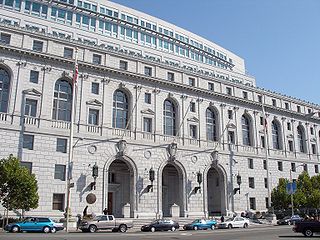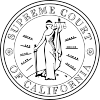Personal jurisdiction is a court's jurisdiction over the parties, as determined by the facts in evidence, which bind the parties to a lawsuit, as opposed to subject-matter jurisdiction, which is jurisdiction over the law involved in the suit. Without personal jurisdiction over a party, a court’s rulings or decrees cannot be enforced upon that party, except by comity; i.e., to the extent that the sovereign which has jurisdiction over the party allows the court to enforce them upon that party. A court that has personal jurisdiction has both the authority to rule on the law and facts of a suit and the power to enforce its decision upon a party to the suit. In some cases, territorial jurisdiction may also constrain a court's reach, such as preventing hearing of a case concerning events occurring on foreign territory between two citizens of the home jurisdiction. A similar principle is that of standing or locus standi, which is the ability of a party to demonstrate to the court sufficient connection to and harm from the law or action challenged to support that party's participation in the case.

DeCSS is one of the first free computer programs capable of decrypting content on a commercially produced DVD video disc. Before the release of DeCSS, open source operating systems could not play encrypted video DVDs.

Universal City Studios, Inc. v. Reimerdes was the first test of the Digital Millennium Copyright Act (DMCA), a United States federal law.
LiViD, short for Linux Video and DVD, was a collection of projects that aim to create program tools and software libraries related to DVD for Linux operating system.

Apple v. Does was a high-profile legal proceeding in United States of America notable for bringing into question the breadth of the shield law protecting journalists from being forced to reveal their sources, and whether that law applied to online news journalists writing about corporate trade secrets. The case was also notable for the large collection of amici curiae who joined in the matter.
In tort law, a duty of care is a legal obligation which is imposed on an individual, requiring adherence to a standard of reasonable care while performing any acts that could foreseeably harm others. It is the first element that must be established to proceed with an action in negligence. The claimant must be able to show a duty of care imposed by law which the defendant has breached. In turn, breaching a duty may subject an individual to liability. The duty of care may be imposed by operation of law between individuals who have no current direct relationship but eventually become related in some manner, as defined by common law.

Minimum contacts is a term used in the United States law of civil procedure to determine when it is appropriate for a court in one state to assert personal jurisdiction over a defendant from another state. The United States Supreme Court has decided a number of cases that have established and refined the principle that it is unfair for a court to assert jurisdiction over a party unless that party's contacts with the state in which that court sits are such that the party "could reasonably expect to be haled into court" in that state. This jurisdiction must "not offend traditional notions of fair play and substantial justice". A non-resident defendant may have minimum contacts with the forum state if they 1) have direct contact with the state; 2) have a contract with a resident of the state; 3) have placed their product into the stream of commerce such that it reaches the forum state; 4) seek to serve residents of the forum state; 5) have satisfied the Calder effects test; or 6) have a non-passive website viewed within the forum state.

David S. Touretzky is a research professor in the Computer Science Department and the Center for the Neural Basis of Cognition at Carnegie Mellon University. He received a BA in Computer Science at Rutgers University in 1978, and earned a master's degree and a Ph.D. (1984) in Computer Science at Carnegie Mellon University. Touretzky has worked as an Internet activist in favor of freedom of speech, especially what he perceives as abuse of the legal system by government and private authorities. He is a notable critic of Scientology.
Tortious interference, also known as intentional interference with contractual relations, in the common law of torts, occurs when one person intentionally damages someone else's contractual or business relationships with a third party, causing economic harm. As an example, someone could use blackmail to induce a contractor into breaking a contract; they could threaten a supplier to prevent them from supplying goods or services to another party; or they could obstruct someone's ability to honor a contract with a client by deliberately refusing to deliver necessary goods.
Ligue contre le racisme et l'antisémitisme et Union des étudiants juifs de France c. Yahoo! Inc. et Société Yahoo! France is a French court case decided by the Tribunal de grande instance of Paris in 2000. The case concerned the sale of memorabilia from the Nazi period by Internet auction and the application of national laws to the Internet. Some observers have claimed that the judgement creates a universal competence for French courts to decide Internet cases.
Personal jurisdiction in Internet cases refers to a growing set of judicial precedents in American courts where personal jurisdiction has been asserted upon defendants based solely on their Internet activities. Personal jurisdiction in American civil procedure law is premised on the notion that a defendant should not be subject to the decisions of a foreign or out of state court, without having "purposely availed" himself of the benefits that the forum state has to offer. Generally, the doctrine is grounded on two main principles: courts should protect defendants from the undue burden of facing litigation in an unlimited number of possibly remote jurisdictions, and courts should prevent states from infringing on the sovereignty of other states by limiting the circumstances under which defendants can be "haled" into court.
Burnham v. Superior Court of California, 495 U.S. 604 (1990), was a United States Supreme Court case addressing whether a state court may, consistent with the Due Process Clause of the Fourteenth Amendment, exercise personal jurisdiction over a non-resident of the state who is served with process while temporarily visiting the state. All nine justices unanimously agreed that this basis for personal jurisdiction—known as "transient jurisdiction"—is constitutionally permissible. However, the Court failed to produce a majority opinion, as the members were sharply divided on the reasons for the decision, reflecting two fundamentally different approaches to how due-process issues are to be analyzed. Justice Scalia wrote the lead opinion, joined in whole or part by three other Justices. Justice Brennan wrote an opinion joined by three other Justices. Justices White and Stevens wrote separate opinions.

Zippo Manufacturing Co. v. Zippo Dot Com, Inc., 952 F. Supp. 1119, was a decision by the United States District Court for the Western District of Pennsylvania in which the Court found personal jurisdiction over a defendant providing Internet services. The case is a landmark opinion regarding Internet jurisdiction, and it is one of the most frequently cited Cyberlaw opinions.

DVD Copy Control Association, Inc. v. Bunner was a lawsuit that was filed by the DVD Copy Control Association in California, accusing Andrew Bunner and several others of misappropriation of trade secrets under California's implementation of the Uniform Trade Secrets Act. The case went through several rounds of appeals and was last heard and decided in February 2004 by the California Court of Appeal for the Sixth District.

DVD Copy Control Association, Inc. v. Kaleidescape, Inc., 176 Cal. App. 4th 697 is a legal case heard by the California Court of Appeal concerning breach of contract and breach of the implied covenant of good faith and fair dealing. It discusses incorporation by reference regarding a supplemental document that was not part of the written license agreement between the parties. The Court of Appeal reversed the trial court's judgment and ruled in favor of the plaintiff, finding that defendant was bound to the entire contract, including the supplemental document.

Cybersell, Inc. v. Cybersell, Inc. was a trademark infringement case based on the use of an internet service mark. The United States District Court for the District of Arizona was asked to review whether the allegedly infringing use of a service mark in a home page on the World Wide Web suffices for personal jurisdiction in the state where the holder of the mark has its principal place of business. The Cybersell holding illustrated that passive websites do not establish personal jurisdiction outside the state in which they are based.

RealNetworks, Inc. v. DVD Copy Control Association, Inc., 641 F. Supp. 2d 913 (2009), is a United States District Court case involving RealNetworks, the movie studios and DVD Copy Control Association regarding the Digital Millennium Copyright Act (DMCA) claims on the manufacturing and distribution of RealDVD, and a breach of license agreement. The district court concluded that RealNetworks violated the anti-circumvention and anti-trafficking provisions of the DMCA when the DVD copying software RealDVD bypasses the copy protection technologies of DVD.

Mavrix Photo, Inc. v. Brand Technologies, Inc., 647 F.3d 1218, is a case in American intellectual property law involving personal jurisdiction in the context of internet contacts.

Boschetto v. Hansing, 539 F.3d 1011 is a diversity jurisdiction case brought by California resident, Paul Boschetto ("Boschetto") against certain private corporations with their principal place of business in Wisconsin. The case involved the determination of the question whether the sale of an item via the internet consumer-to-consumer trading portal, eBay, by the defendants in Wisconsin to the plaintiff in California, was sufficient to confer personal jurisdiction over a non-resident defendant in the buyer's forum state. At the first instance, the United States District Court for the Northern District of California decided against Boschetto and held that a lone “eBay sale consummated with a California purchaser, was insufficient to establish jurisdiction over any of the defendants.” Boschetto appealed against the decision to the United States Court of Appeals for the Ninth Circuit. The appellate court affirmed the decision of the district court and denied relief to Boschetto. The Court became the first federal appellate court to address whether personal jurisdiction in a forum state could be established when an out-of-state resident makes use of an intermediary website accessible by forum-state citizens.

Hearst Corp. v. Goldberger was a case out of the U.S. District Court for the Southern District of New York in which the court developed a reasoned framework to determine the proper exercise of personal jurisdiction in cases involving activity in cyberspace. The court determined that it lacked jurisdiction over an out-of-state defendant whose website was accessible to New York residents.









